What Season Did Sg1 Go Back in Time
This article originally appeared on Den of Geek UK.
Twenty-five choices from a pot containing over 200 entries. That sounded simple enough. It was only upon plunging through the event horizon of the episode guide and embarking on an intergalactic journey that spanned ten years that Stargate SG-1 's true complexities began to present themselves.
Despite being notionally episodic, the show loved to tinker with any number of long-term plot arcs across its 10-season run, devoting a few episodes each year to the return of familiar faces and weaving those stories together in unexpected ways. Rather than attempting to encapsulate the full scope of a decade-long narrative that wove together military thrills, contemplative sci-fi and good old alien monsters, I've attempted to showcase episodes that either evolved the show in some notable, persistent way, those that most readily captured the "spirit" of Stargate , or both.
As with all articles of this ilk, though, this is a highly subjective list. Different people want different things, after all – so if you find yourself disappointed by a lack of Jaffa-centric episodes, clip shows or the (cruel, deliberate) exclusion of "Wormhole X-Treme!" make sure to take to the comments and state your case for the episodes you hold nearest and dearest. The more Stargate love the better, as far as I'm concerned. Without further ado…
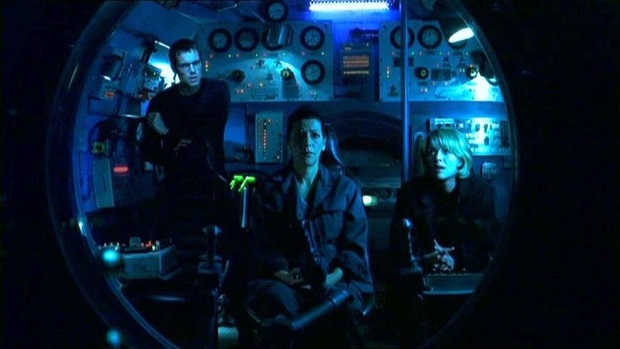
25.Watergate (Season 4)
The plot: Russia nabs its own Stargate and SG-1 are called in as technical support when it won't shut down. Counsellor Troi turns up to help.
Why it's great: As we've established, many supposedly stand-alone episodes of SG-1 still found ways to push larger story arcs forward. That's the case with "Watergate" – the aliens-of-the-week plot is fairly standard fare, dealing with aquatic, microscopic life-forms accidentally abducted by a team of scientists, and it's not the first time the show's had characters being possessed by tiny sentient creatures.
Related: Can Stargate Make A Return?
Here, the immediate peril is balanced out both by the larger revelation that the Russian government has acquired its own Stargate – one that can overrule America's, no less – and the ensuing political bickering, but also the unexpected return of Harry Maybourne, rogue NID operative and the distaff counterpart to Colonel O'Neill. What we get as a result is a tense, tight episode that offers both a tidy stand-alone story while laying the ground for future possibilities.
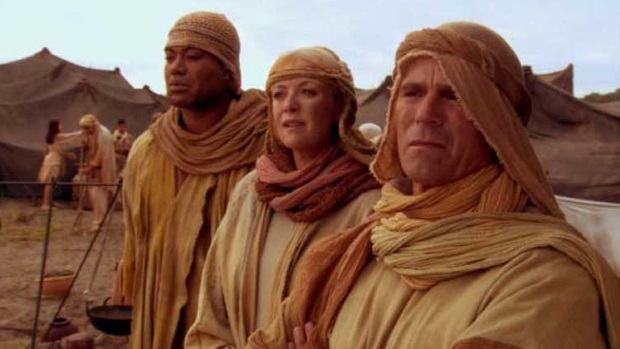
24. Moebius (Season 8)
The plot: Hunting for a vital power source, SG-1 travel back to Ancient Egypt and accidentally change history, resulting in a timeline where everyone gets new glasses.
Why it's great: Delve into the many Stargate DVD commentaries and you'll discover that, as time went on, the production team avoided using cliffhangers to end a season because they were increasingly convinced each year would be their last. By the time we reach "Moebius," in fact, the season's villains have already been defeated once and for all, clearing the way for a time travel story that ties back to the original Stargate movie.
Related: What We Know About Stargate: Origins
SG-1 , as any fan knows, loves its alternate-future storylines, and this one's a romp of the highest order. The glee with which the cast portray their alt-selves is almost palpable as they indulge in some Stargate speed-dating at the behest of their other selves and set out on a quest to fix the timeline. "Moebius" is very much a love-letter to the show's own history, and while it turned out not to be the last adventure after all, it could have served as a sweet parting indeed.
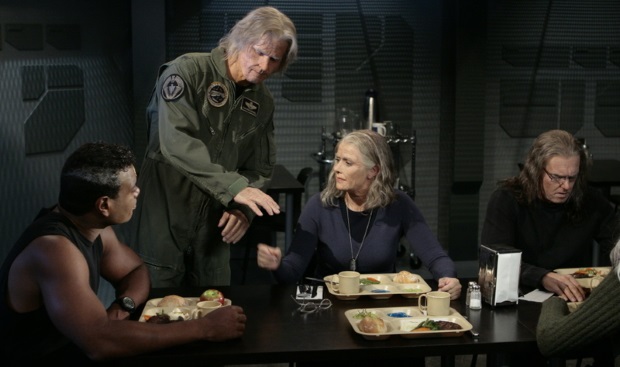
23. Unending (Season 10)
The plot: The team are trapped in a slow-time bubble with nothing to amuse them except a Creedence CD and a box of old-age prosthetics.
Why it's great: That thing I just said about fear of cancellation? The tenth season was one of the few occasions everyone felt confident that the show would be renewed, which left the producers adrift in a sea of unresolved plots when the bad news arrived. Rather than rush the ending, a straight-to-DVD movie was confirmed that would give the writers space to wrap up the war against the villainous Ori. By contrast, the show's final televised episode could be a smaller, more intimate piece.
SG-1 are often portrayed as borderline workaholics – Carter spends her off-hours tinkering with machines, Daniel studies artefacts, Teal'c trains and meditates – so it's both brave and borderline cruel to force these characters into a position where downtime is all they have. As a result, we get some great character moments – a frustrated Mitchell demolishes his room, Daniel finally allows himself to acknowledge Vala's affection for him – not to mention some poignant group scenes. "Unending" may not be bold and impactful, and it's certainly not the send-off everyone wanted, but then it was never really goodbye…
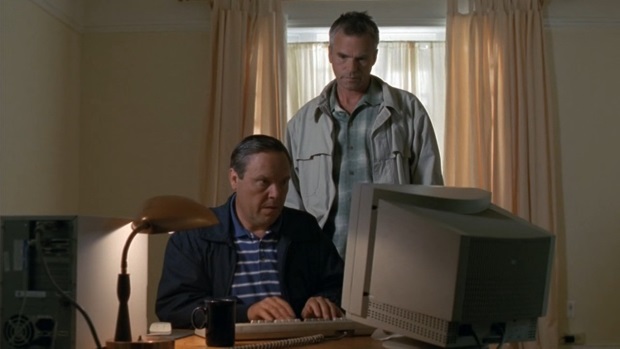
22.Chain Reaction (Season 4)
The plot: A nefarious scheme forces General Hammond into retirement. O'Neill partakes in skulduggery. Stargate Command blows up a planet.
Why it's great: There are a fair few Earth-based episodes of SG-1 , mostly revolving around a group seeking to acquire alien technology by any means necessary. These confrontations generally end up as a nil-nil draw, with SG-1 recovering whatever's been stolen but the bad guys escaping to fight another day, and can be pretty forgettable as a result.
Related: The Best Stargate SG-1 Guest Performances
"Chain Reaction," by contrast, manages to feel like a genuine victory. At the very least it sidesteps the tendency of NID episodes to have people bundled into black vans or protracted shootouts in warehouses, and is all the more effective for it. Rather, things are kept tense by an escalating B-plot that explains why you shouldn't just go chucking nukes through the Stargate.
This time it's up to O'Neill to play dirty, reluctantly teaming up with Harry Maybourne and resorting to the same tactics that the NID have employed so successfully – blackmail, extortion and threats. The acting is superb throughout, particularly Ronny Cox as Kinsey, who gets to drop his affable Senator's persona and spit pure acid for once. And hey, it's not every day Stargate gets to pay homage to Silence Of The Lambs .
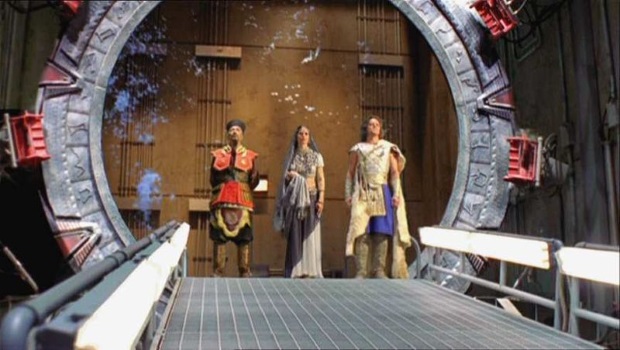
21.Fair Game (Season 3)
The plot: Earth must give up its Stargate or face annihilation at the hands of the Goa'uld System Lords. Thor brings his own chair from home.
Why it's great: Having deposed Apophis and dispatched Hathor in recent weeks, it was only logical that other intergalactic bad guys might view Earth as a nuisance to be dealt with sooner rather than later. That's why it's refreshing to have the prospect of Earth's annihilation confronted directly rather than glossed over – there's only so many times you can believably defeat an alien armada, even if you have got MacGyver on your team.
More significantly, this episode – in tandem with its immediate predecessor, "Seth" – cements the idea that there can be different flavours of Goa'uld, not just the shouty, scowly Apophis-types we've encountered to date. Instead we meet the haughty, duplicitous Nirrti, the stoic Lord Yu and the oily, confident Camulus in the first sit-down chat the show has ever had with its villains. While relatively light on action, it's an important story with an unexpected twist at the end, and adds some much-needed variety to the Goa'uld.
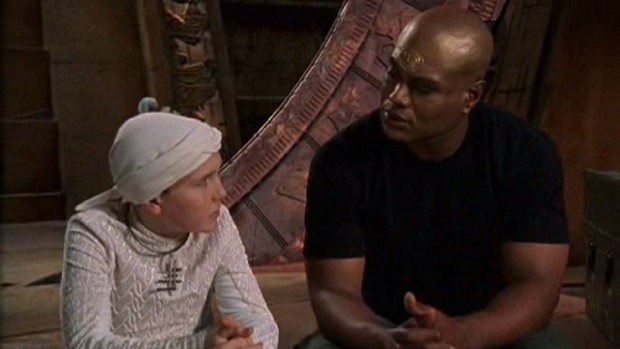
20. Learning Curve (Season 3)
The plot: SG-1 visit a world where Google is powered by children, and Cultural Differences ensue.
Why it's great: Make no mistake, this is a very schmaltzy episode. The scenes where O'Neill – apparently a celebrity at his local school for some reason – absconds with the precocious Merrin, so that she can enjoy being a kid rather than a memory stick, are particularly twee. That they work at all is largely due to a performance from Richard Dean Anderson that's by turns tender and exasperated, but always heartfelt.
The story also takes an unusual stance, because Stargate Command has no equivalent of Star Trek 's Prime Directive, and characters are generally okay with interference and contamination as long as it aligns with their own moral compasses. Many future plots will see our team walk away from societies whose cultural values don't align with our own, even if that means giving up life-saving technology. Here, it's implied that the decision not to intervene – though O'Neill's influence ultimately saves the day anyway – is Daniel's, and that he makes it not from the certainty of wisdom but due to the fear of humanity's ignorance. Rarely will our heroes be this humble, or this conflicted, again.
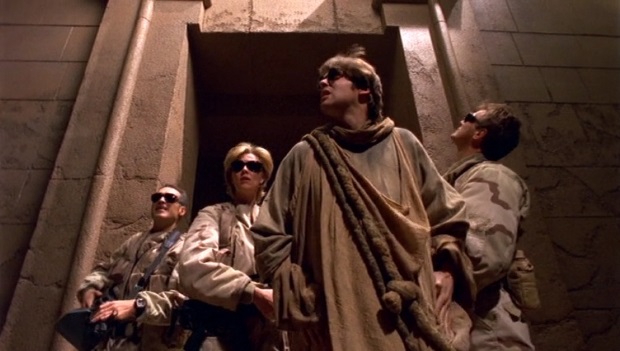
19.Children Of The Gods (Season 1)
The plot: An elite group soldiers is formed, with a mission to get out among the stars and royally screw everything up.
Why it's great: This is by no means a perfect episode, nor even the perfect pilot. In fact, "Children Of The Gods" holds the dubious distinction of being revisited and remastered by its creators to cut out some of the more questionable decisions – the full-frontal nudity, for example. There's a lot that it gets right, though, which is no easy task when you're trying to expand a self-contained motion picture into an ongoing series.
Latest TV reviews
Recasting and a few tweaked names aside, the decision to include the movie's major players – Kawalsky, Skaara and Kasuf among them – provides an instant sense of familiarity and establish that this is very much a sequel to that film, rather than a reboot. It's a smart move that saves a lot of wheels from reinvention, and makes us more kindly-disposed to the main characters than we otherwise might be – after all, we've already met them. With the weight of David Arnold's bombastic movie score underscoring the action, "Children Of The Gods" feels more like a sequel than a starting point, and that confidence helps it stand the test of time.
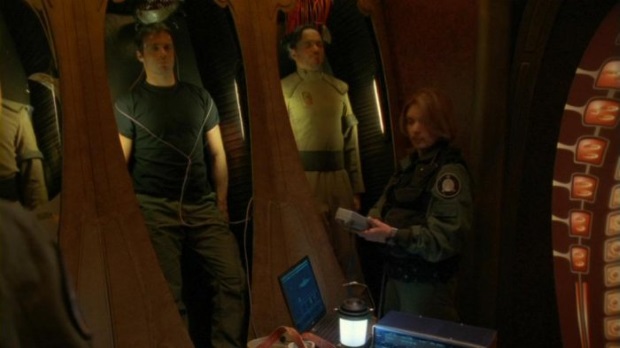
18. Lifeboat (Season 7)
The plot: Daniel gets a brain-dump full of alien refugees, which turns out to be a thing that can kill you.
Why it's great: Michael Shanks. So very much Michael Shanks. The writers have done Daniel possession stories before (and will again), but "Lifeboat" is a tour de force for the actor to showcase his dramatic range as he flips between the persona of a terrified child, a beleaguered engineer and an imperious nobleman, among others. Teryl Rothery more than rises to the challenge of matching Shanks's performance, however, as her mounting helplessness and frustration boils over into an explosive confrontation with the arrogant Martice personality.
There's an ethical dilemma here, too – does Daniel have the right to live at the expense of all the minds inside him? – but ultimately this episode stands tall on the strength of its talent, rather than its script or ideas.

17.Origin (Season 9)
The plot: Having body-jacked two NPCs in a galaxy far, far away, Daniel and Vala accidentally doom all of humanity. Again.
Why it's great: Rebooting the series to include Beau Bridges, Ben Browder and B-name combo-breaker Claudia Black sees this season kick off with what can loosely be considered a six-part story. Really, though, it's here in part three that the true menace of the Ori and their Priors is really highlighted, especially when the meddling monks start appearing on planets across the Milky Way.
Related: Did Longevity Hurt Stargate?
Special credit has to go for the climax of the story, where the goodies are about to be burned alive as heretics. It's particularly nerve-wracking because, in the previous episode, Vala met a similarly gruesome fate – one of the most graphic SG-1 has ever shown us – and was only resurrected by a Prior's intervention. She knows precisely what's about to happen to her second time around, and so do we. Fire may seem a trivial threat in a universe of spaceships and Stargates, but "Origin" proves it's the most primal dangers that can resonate most with an audience.
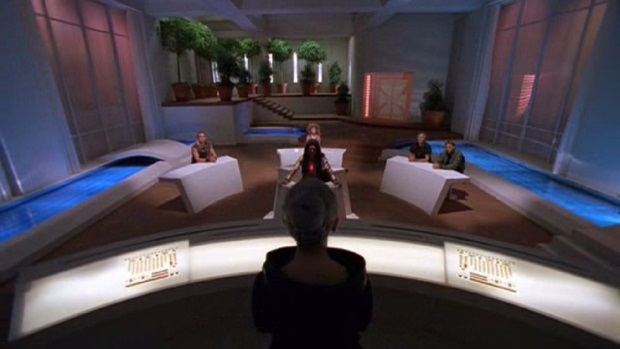
16.Pretense (Season 3)
The plot: SG-1 head to Tollan court to argue for the release of O'Neill's friend Skaara from Goa'uld possession, as well as dispute a couple of parking tickets.
Why it's great: Every sci-fi series worth its salt needs some sort of courtroom episode, and SG-1 has a number of cracking examples – this time around, both Jack and Daniel team up to play Ace Attorney. Within the trial setting, we get our first taste of how the Goa'uld feel about the "cattle" they enslave, and with the pacifistic Lyra as a judge, it never feels certain that the Triad will default to humanity's point of view.
Elsewhere, the discovery that the Goa'uld have engineered Skaara's capture as a way to attack both the Tollan and SG-1 keeps the plot moving – it's fairly common for trial episodes to have one party using underhanded tactics, but the revelation that Skaara got himself arrested is a genuine twist, as is SG-1's way of dealing with the attack. Part morality play and part tactical action, "Pretense" is a great example of what makes Stargate unique.
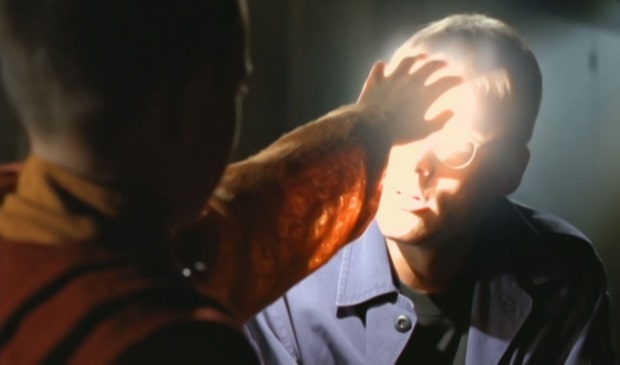
15. Absolute Power (Season 4)
The plot: Daniel Jackson receives the knowledge of the evil Goa'uld race, and immediately invents blister packaging, auto-playing web content and burger sauce.
Why it's great: By all rights, this really should be a "must-see-once" episode – by the time you realize that what you're seeing is effectively a dream sequence (the obliteration of Moscow being something of a clue) and that none of this "matters," the episode's number should be up.
It's so well-paced, though, and Shanks shapes his descent into cartoonish supervillainy so well, that even when he ends up strutting around in an evil underground lair beneath his opulent mansion, the individual steps he took to get there still seem feasible. It's also an important moment for Daniel's character – with his wife dead and the Harcesis discovered, he's no longer stepping through the gate in search of his family, but because his experiences with the Goa'uld and their latent memories have taught him that fighting is the right thing to do.

14. A Matter Of Time (Season 2)
The plot: Things get seriously timey-wimey under Cheyenne Mountain when the team accidentally dial up a black hole.
Why it's great: We've had the time travel episode, we've had the trial episode, so now let's turn our attentions to another SG-1 staple – the second of two stories in this list where the gate itself is putting Earth in danger. From the moment O'Neill, who's normally the embodiment of the mantra "we don't leave our people behind," gravely tells Hammond that the team trapped in the black hole's clutches are impossible to save, we know that the stakes are high.
As the team struggle to shut down the Stargate, they also find themselves needing to contend with the black hole's time dilation effect. The script could very easily stray into technobabble at this point, but the addition of marines who assume Stargate Command has been invaded help keep the rescue grounded in human terms. As with many of the best SG-1 episodes, the solution to the problem turns out to be a property of the Stargate that threatened the team in a previous adventure, only now Carter's turned it to their advantage. The black hole itself will go on to reappear later in this list…

13.2010 (Season 4)
The plot: It's 2010, and Earth is a paradise thanks to our new buddies, the Aschen – a species even more tedious than Jaffa politics.
Why it's great: This is a very different kind of Stargate episode for a number of reasons – a two-parter in the loosest possible sense, it manages to intertwine some long-awaited moments with a sense of innate wrongness that permeates everything from the set design to the soundtrack.
For one thing, it's great to see the writers take a stab at a world where our gate is no longer a military secret, something that had been the subject of much debate and theory online. It's a tantalizing concept to explore in-depth, one that almost happened as a DVD movie, and we get given just enough world-building to satisfying us before the creeping dread kicks in.
The idea of a species that exterminates you while pretending to be your best mates is an eerie, if not entirely original, premise, and it's enriched here because the Aschen are a group of surly bureaucrats rather than charismatic messiahs. They almost don't seem interesting enough to be dangerous, which makes the slow realization that we've already been conquered all the more effective. It's only a shame that the pseudo-sequel, "2001," never quite hits the same levels of atmosphere.

12. 48 Hours (Season 5)
The plot: Teal'c gets stuck in the Stargate. No, not like Winnie-the-Pooh.
Why it's great: Reason #1: five years of political intrigue episodes slamming together in a crescendo that keeps making the situation worse and worse. When Teal'c's energy pattern becomes trapped in Earth's gate, forcing them to suspend operations, more and more wolves begin emerging from the shadows and encircling Stargate Command.
The Russians, whose help is needed to contact off-world allies for a solution, take the opportunity to demand full access to alien trinkets. Harry Maybourne pops up, as does his replacement Simmons, played with typical malevolent relish by John de Lancie and itching to relieve General Hammond of duty. Oh, and there's a time-limit on top of everything else. Every new pressure is introduced just when the team finally seem to be gaining the upper hand, and it all meshes superbly.
Reason #2: The first appearance of fan-favorite Doctor Rodney McKay. The character will never again be quite as obnoxious, arrogant and condescending as he is here – he has to be at least partially likeable as a series regular – and David Hewlett is on fine form, obliviously adding to Carter's stress levels even while he's convinced he's ultimately going to save the day. He's just one of many superb performers in this episode, which serves to remind us why SG-1 keeps bringing these characters back for another spin of the wheel.
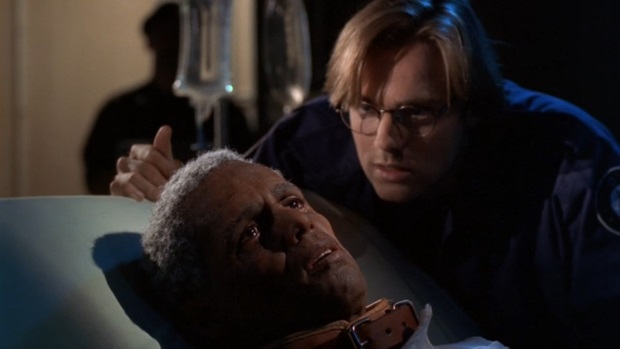
11.Serpent's Song (Season 2)
The plot: A defeated Apophis demands asylum on Earth, but his tormentor isn't far behind. Also his tormentor is Satan, so that's a thing.
Why it's great: Up until this point in the series, Apophis has mostly been an unassailable figure of menace, either posed imperiously behind his personal force-shield or beheld only a looming figure on a viewscreen. There's no small amount of schadenfreude to enjoy watching SG-1 – who've each suffered very personal losses at his hands – coming to his bedside one by one to indulge in some well-earned gloating and mockery.
And yet, as Apophis's health declines and the host consciousness, subsumed for thousands of years, begins to break through, we see our heroes' smugness drop away. It's no longer a despot in their care, it's one of his victims, and when the Tok'ra Martouf coolly informs them that Sokar will almost certainly use a Goa'uld sarcophagus to repeatedly revive and torture Apophis, it's not the snake inside we're left to feel sorry for.
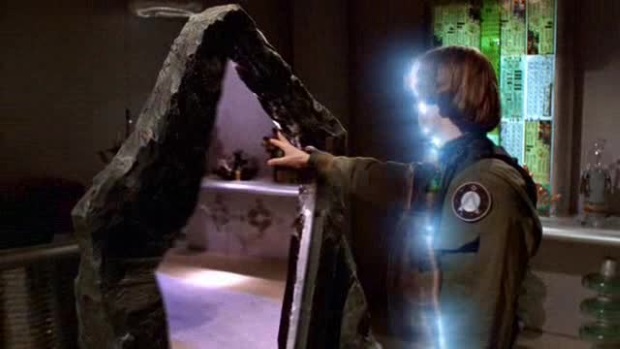
10.There But For The Grace Of God (Season 1)
The plot: Daniel touches an alien mirror which takes him to an alternate universe. A "Mirror Universe," if you will.
Why it's great: What does Stargate like more than time travel episodes? Why, parallel universe episodes, of course! It's an episode that might as well be called "Have Your Cake And Eat It," as it enables the writers to show us the full scale of what the Goa'uld are capable of doing to Earth without worrying about the long-term consequences.
We do get moments of playfulness here and there, like the reveal of mirror-O'Neill and mirror-Carter's engagement, but by and large this is a grim, bleak affair. The alternate Stargate Command is fresh out of last-minute plans and they're preparing to send a nuke to Chulak not because it'll help, but because they simply can't think of anything better to do. They've lost.
Later installments would arguably get more creative with the notion of mirror universes, but the pervasive hopelessness here helps cement this adventure as Stargate 's most memorable 'What if?' episode.
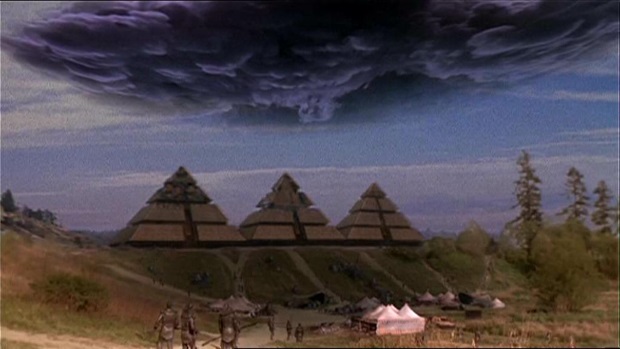
9. Thor's Chariot (Season 2)
The plot: As punishment for destroying Thor's hammer, Carter and Daniel are forced to take part in The Krypton Factor.
Why it's great: What does Stargate like better than time travel episodes, parallel universe episodes and— all right, I'll stop that now. Puzzle-filled quests for our heroes to overcome like pop up throughout the series, which makes sense given how closely they're tied to the mythology that cloaks the show's alien races, but solving the Asgardian escape room in this episode is particularly urgent. This time, SG-1 are responsible for breaking the thing they need Thor to fix.
This is the team's core dynamic at its most effective – Carter and Daniel bouncing off one another to fill in gaps in the other's knowledge, while O'Neill and Teal'c run around blowing things up. When we do see the true form of the Asgard, it's a lovely subversion of expectations, as Daniel blithely assumes they're in the presence of yet another hologram before Thor starts telling him off. It's not a complicated story, but it absolutely nails the fundamentals.
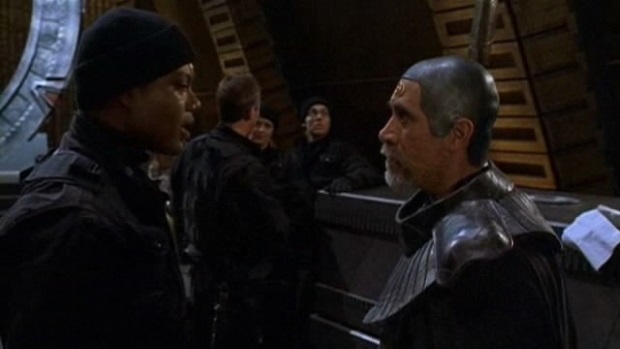
8.The Serpent's Lair (Season 2)
The plot: Revenge is a dish best served Goa'uld when Apophis's fleet reaches Earth.
Why it's great: Discussing the making of Avengers: Infinity War , the film's creators suggest that you always want your heroes at their lowest ebb when they encounter their worst enemy. That's certainly the case in "The Serpent's Lair" – the Stargate program has been shuttered, SG-1 have defied orders, and their plan of sticking C-4 explosive all over Apophis's ship to destroy it is scuppered because the Goa'uld have decided to take two cars.
Sneaking about and trying to sabotage an enemy vessel before it gets to Earth is an idea that both SG-1 and Atlantis will revisit frequently, but it's arguably most compelling here because of how badly the odds are stacked against the team. They've got no Tok'ra support, no energy weapons and no F-302 fighters to save them – only Teal'c's irascible mentor Bra'tac even knows they're aboard. Tricks that would go on to be familiar, like an SG-1 member using a sarcophagus to revive themselves, are still new and fresh in this episode, so while it loses a little the second time around because later adventures borrow so heavily from it, it remains a great first watch.
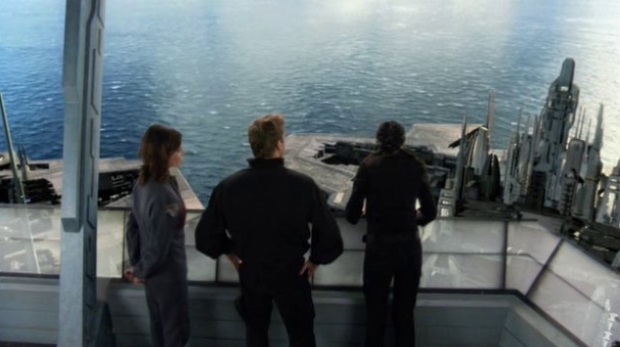
7.The Pegasus Project (Season 10)
The plot: The teams from SG-1 and Atlantis team up and head to the Pegasus Galaxy in search of higher ratings.
Why it's great: Fanservice, plain and simple. Having teased Daniel Jackson making the trip to Atlantis for quite literally years, just getting to see him tearing into that city's Ancient Database with such gusto can't help but raise a smile. The scenes where he first suspects and then confronts Morgan le Fay, an ascended Ancient who's masquerading as her own hologram, are particular highlights.
It's a shame that the rest of the cast – including Atlantis regulars Sheppard and McKay – don't get as much to do, as most of the action sequences in the episode feature spaceships rather than soldiers. The plan is to permanently clog the Ori's "supergate" using the black hole first discovered all the way back in "A Matter Of Time." Still, it's nice to have both teams interacting, however briefly, and the final payoff – the first time in the series Earth forces have been able to destroy an Ori warship – feels truly epic in its achievement and worthy of the crossover.
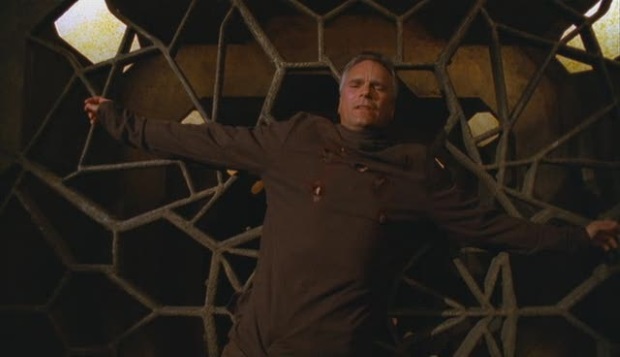
6.Abyss (Season 6)
The plot: Having recently been defrosted, O'Neill finds himself very much in Ba'al's court.
Why it's great: So many ways. For starters, this episode is the culmination of a number of character arcs, both old and new. O'Neill's recently been given what is (for him) a highly unpalatable choice – take a Tok'ra symbiote, or drop dead. When he reluctantly agrees, this episode appears to confirm O'Neill's worst fears when the symbiote abandons him in the clutches of Ba'al, a Goa'uld System Lord who proceeds to torture him for information he doesn't possess.
It's the slow, deliberate nature of that torture that makes it so chilling, as O'Neill finds himself tossed around by gravity fields and assaulted with drops of an acid so caustic it can, and does, burn its way through his body – only for Ba'al to slap him into a sarcophagus and start the process over again. This was presented as an abstract horror back in "Serpent's Song," and now we're living it along with O'Neill.
As cruel as the premise is, and as heartfelt the reveal of why the Tok'ra in Jack came to Ba'al's world turns out to be, it's the interactions that make this episode truly shine. Unlike other Goa'uld, Ba'al turns out to be merely bemused by O'Neill's usual snark, and the scene where Daniel – visiting as an ascended being – offers to help Jack ascend, only for Jack to demand that Daniel simply kill him, is one of the most powerful in the program's long history.
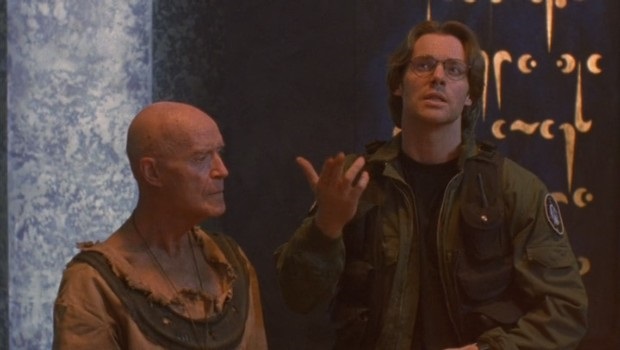
5. The Torment Of Tantalus (Season 1)
The plot: SG-1 go hunting for a missing scientist and Daniel gets hooked on intergalactic Wikipedia.
Why it's great: If we're being honest, a particularly uncharitable person could look at the first season of SG-1 in particular and divine some, shall we say, connective tissue between its stories and Star Trek 's. The plot where a character contracts a rapid-aging virus, for example, or the one where a human military commander has decided to play God on a primitive planet. "The Torment Of Tantalus," by contrast, is the first story in the run that feels uniquely Stargate .
The main source of jeopardy in this episode is simple but effective – the Dial-Home Device is broken, trapping the team in a crumbling ruin as a storm approaches. This goes a long way towards demystifying the Stargate, showing that while impressive, it's still just a machine – it can be broken, and it can also be jerry-rigged in an emergency. It's the first time the writers get playful with the gate as a thing, and paves the way for many future episodes that see the titular rings stolen, hacked, repurposed as waste disposals and strung together in vast, galaxy-spanning chains.
While this is going on, we also get a glimpse of a mysterious device that foreshadows an alliance between four galactic powers that will come to play a major part in the show's mythos. All of which would be pretty dry stuff were it not for the chemistry between missing scientist Ernest Littlefield and his fiancée Catherine Langford. The reunion is played superbly; Catherine's anguish clearly evident when Ernest bitterly dismisses her as another hallucination offering false hope. All told, it's a fine example of an episode that deftly interweaves mythology, action, a technical conundrum and a large amount of heart – in other words, it sets down the recipe for many great Stargate episodes to come.
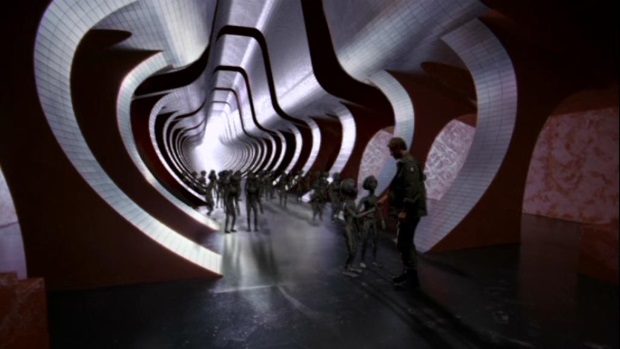
4. The Fifth Race (Season 2)
The plot: O'Neill learns the importance of not sticking your head in an alien orifice, even if it is bulging out of the wall.
Why it's great: All right, yes, the idea of someone getting super-intelligence that will eventually kill them is a bit of a cliché. The fact that "The Fifth Race" works despite its fairly staid premise is largely thanks to Richard Dean Anderson, who fills O'Neill's response to his own increasing intellect first with frustration, then with resignation, and finally sadness as SG-1 repeatedly fail to find a cure.
O'Neill delights in pretending to be dumber than he is – it's practically his superpower, allowing him to throw pompous alien overlords off-kilter and cut through the fluff that the military lifestyle often mires him in. It's understandable that being forced to confront his own brainpower, particularly when it overwhelms his ability first to speak, and then even to control his own actions, leaves him feeling vulnerable and isolated – all of which comes through wordlessly.
And then, having spent a fairly bleak 45 minutes examining O'Neill's apparent death sentence, we meet the Asgard in the flesh for the first time. Better still, they hesitantly admit that humanity might one day be ready to the join them, becoming the Fifth Race of those discussed in "The Torment Of Tantalus."
For the first time, Stargate sets out its mission statement as going beyond looking to survive in the face of annihilation. Mankind, we are told, has the potential to exceed all expectations and flourish. Twenty years after this episode aired, it's still important to be reminded of that now and then.

3.Heroes (Season 7)
The plot: A film crew tries to make a documentary about everyday life at the SGC. O'Neill puts Hammond's stapler in jelly again.
Why it's great: Expectations. After seven years, we've got a lot of them, and this episode revels in twisting them this way and that. We expect, for example, to see staff-wielding Jaffa trading fire with MP5-wielding airmen in the forests of Vancouver. We expect frantic dialling of the Stargate as the Goa'uld close in, and for stray shots to pepper the gateroom as our teams scramble safely home. All of this happens in "Heroes," but for once we don't get to see it.
The audience is benched on the sidelines along with the always-excellent Saul Rubinek and his film crew, forced to play out the adventure in our minds. When we're told that O'Neill might be dead, we don't really believe it – they haven't shown us the body, after all, and our expectations are that you don't kill the main cast off screen. And then they show us Doctor Janet Frasier – kind, unwavering Doctor Frasier – the only person on the base who hadn't dismissed the documentary team out of hand, out saving lives. And we see her die, and we see her honoured, and we see the grief her absence causes.
From the handheld cameras to the talking heads to the non-linear narrative and the tragedy it hides, Heroes delivers everything besides the audience's expectations, and is supremely powerful as a result.

2.Window Of Opportunity (Season 4)
The plot: It's the time loop episode.
Why it's great: SG-1 frequently has grin-worthy moments, but it descends into out and out comedy less often than some would have you believe. All of the main cast get a chance to flex their funnybones here, though, when an Ancient time machine going wrong forces O'Neill and Teal'c to repeatedly live the same day over. It's only when Daniel innocently suggests that this means they can act without consequences that we descend into glorious gate-golfing, condiment-drawing, ball-juggling antics Bill Murray would be proud of.
If this episode were simply funny, that might have been enough to nudge it into the lower echelons of this list. "Window Of Opportunity" scores so highly because it's shored up by classic Stargate foundations – an alien machine gone wrong, a problem that has to be translated, and above all it's heart rather than head that saves the day. Despite all of the chalkboard sessions, the team never manages to fix the errant time machine. Having spent an episode making us laugh, it's O'Neill's sudden flare-up into very raw anger – acknowledging the death of his son and admitting that he couldn't handle reliving it ever again – that ultimately sees the loop brought to an end.
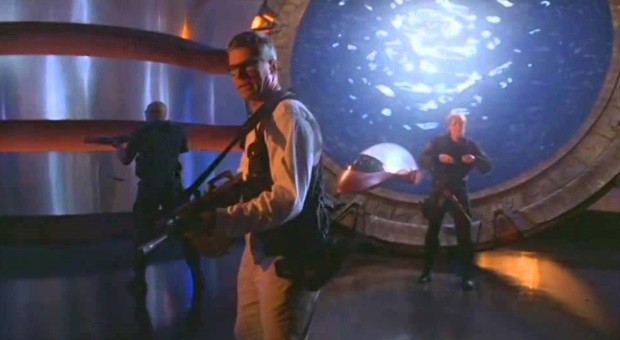
1.Nemesis (Season 3)
The plot: Thor's got a new ship, but it's crashing. Turns out there's a couple of bugs.
Why it's great: Throughout this rundown, we've been examining the strange alchemy that makes a great Stargate SG-1 episode – the mix that helped the show stand out from the crowd and made it such a success. "Nemesis," the third-season finale and the episode that introduces the insect-like machine Replicators, may just be the finest example of that alchemy at work.
There's plenty of running and gunning to be had, as well as a spacewalk scene that isn't afraid to slow the pell-mell pace of the plotting down for its duration so it can ratchet up the tension. Not only do we have the larger, nebulous threat of the Replicators bubbling away in the background but there are plenty of smaller obstacles to juggle, like Thor's declining health and how to escape. Everyone in the cast has their moment to shine – Daniel may be hospitalised, but Michael Shanks is pulling double-duty as Thor – and what little down-time there is in the story gets wisely used to bring the characters closer together as friends.
The final surprise, that SG-1 manage to flee Thor's doomed warship and the armada of Replicators by teleporting Earth's gate aboard and escaping through it, is one of the most elegantly simple solutions in the show's run. It's perfectly plausible, the idea is seeded throughout the story, but you never see it coming. Hammond's expression when his prized doughnut fwooms out of existence is worth the price of admission alone.
"Nemesis" is a brilliantly crafted piece of television from a creative team who were clearly firing on all cylinders, perhaps here most of all. When you revisit it, along with the other episodes in this list, it's easy to see why Stargate SG-1 ran for so long – and why it's still so fondly remembered.
What Season Did Sg1 Go Back in Time
Source: https://www.denofgeek.com/tv/25-best-stargate-sg-1-episodes/
0 Response to "What Season Did Sg1 Go Back in Time"
Postar um comentário